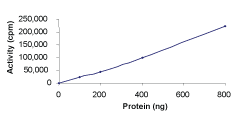
CAMKK2, Active(C18-10G)
FOR BULK ORDER REQUESTS PLEASE CONTACT US
Description :Recombinant full-length human CAMKK2 was expressed by baculovirus in Sf9 insect cells using an N-terminal GST tag.
Species :Human
Tag :GST tag
Expression System:Sf9 insect cells using baculovirus
Sequence :Full Length
Genbank Number :NM_172226
Specific Activity :Sample Kinase Activity Plot. For specific information on a given lot, see related technical data sheet.
Purity :Sample Purity Data. For specific information on a given lot, see related technical data sheet.
Storage, Stability and Shipping :Store product at –70oC. For optimal storage, aliquot target into smaller quantities after centrifugation and store at recommended temperature. For most favorable performance, avoid repeated handling and multiple freeze/thaw cycles.
Applications :Kinase Assay, Western Blot
Molecular Weight :~88 kDa
Gene Aliases :CAMKK; CAMKKB; KIAA0787; MGC15254
Scientific Background :CAMKK2 (CAMKKβ) is a member of the CAMKK family. It is broadly distributed in tissues with highest levels in brain, thymus, spleen, and testis (1). CaMKK2 undergoes intramolecular autophosphorylation, is regulated by Ca2+/calmodulin and phosphorylates CaMKI and CaMKIV on Thr177 and Thr200, respectively. CaMKK2 activates both CaMKI and CaMKIV when coexpressed in Jurkat T cells. CaMKK2 also phosphorylates and regulates the activity of AMPK, which is an important regulator of cellular metabolism in response to metabolic stress (2).
References :
1. Anderson, K.A. et al: Components of a calmodulin-dependent protein kinase cascade. Molecular cloning, functional characterization and cellular localization of Ca2+/calmodulin-dependent protein kinase kinase beta.
2. Hurley, R.L. et al: The Ca2+/calmodulin-dependent protein kinase kinases are AMP-activated protein kinase kinases. J Biol Chem. 2005 Aug 12;280(32):29060-6.
Product Sheets (By Lot #) :
Research Areas :Neurobiology, Cardiovascular Disease, ERK/MAPK Pathway, PKA/PKC Pathway, Ser/Thr Kinases, Neurobiology, Cardiovascular Disease, ERK/MAPK Pathway, PKA/PKC Pathway, Ser/Thr Kinases
